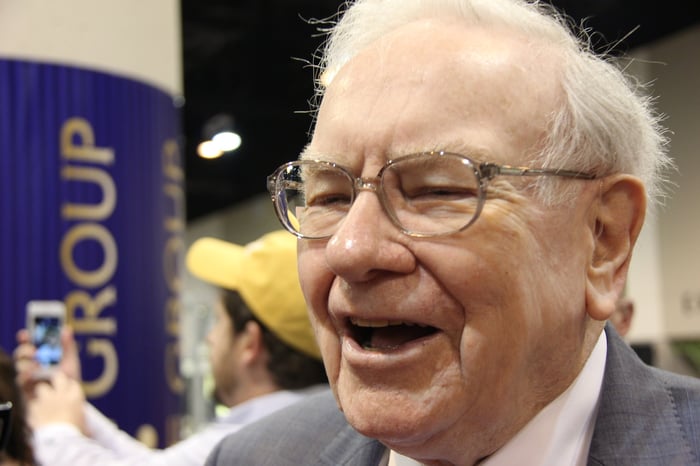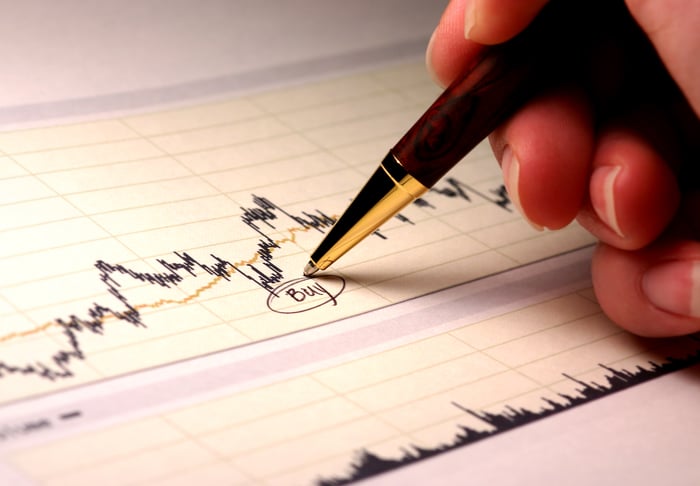When Berkshire Hathaway (BRK.A 0.64%) (BRK.B 0.54%) CEO Warren Buffett speaks, Wall Street attentively listens. That's because the Oracle of Omaha has crushed the benchmark S&P 500 since taking over as Berkshire CEO in 1965. The 3,787,464% aggregate gain in Berkshire Hathaway's Class A shares (BRK.A), through the end of 2022, is 153 times greater than the total return, including dividends paid, of the benchmark S&P 500 over the same period.
Mirroring Warren Buffett's trading activity has been a profitable venture for nearly six decades -- and it's easier than ever to do, thanks to Form 13F filings with the Securities and Exchange Commission.

Berkshire Hathaway CEO Warren Buffett. Image source: The Motley Fool.
Berkshire Hathaway's 13Fs are a gold mine for investors
In simple terms, a 13F provides investors with a snapshot of what money managers with at least $100 million in assets under management were holding at the end of the most recent quarter (in this case, as of Dec. 31, 2022). This snapshot allows investors to determine what the smartest, most successful fund managers bought, sold, and decided to continue holding in the latest quarter.
Over the past seven years, 13F filings have shown that Warren Buffett and his investing lieutenants (Todd Combs and Ted Weschler) have put big bucks to work in a select few companies.
For example, shares of tech stock Apple (AAPL -0.57%) were first purchased during the first quarter of 2016. Not including the shares held by Warren Buffett's secret portfolio, the Oracle of Omaha and his team have sunk more than $33 billion into Apple stock in seven years.
This has been a wildly successful investment for Berkshire Hathaway, with an estimated unrealized gain of $98 billion (not counting dividends). Apple has exceptional branding power, a loyal customer base, and a dominant lineup of products, led by the iPhone. It's also benefiting from the rapid growth of subscription services. However, Buffett's favorite aspect of Apple might just be that it's repurchased more than $550 billion of its common stock over the past 10 years.
Warren Buffett and his team have put a boatload of the company's cash to work in energy stocks, too. Close to $30 billion combined has been spent purchasing shares of Chevron (CVX 0.75%) and Occidental Petroleum (OXY 0.09%). Chevron became a continuous holding during the fourth quarter of 2020, with Occidental common stock entering Berkshire's portfolio in the first quarter of 2022.
This sudden fascination with energy stocks is likely based on the belief that crude oil prices will remain elevated for years to come. Years of capital underinvestment tied to the COVID-19 pandemic, coupled with Russia's invasion of Ukraine, makes it unlikely that global crude oil supply can be meaningfully increased anytime soon. This cap on supply should help put a floor beneath crude oil prices and boost the profit potential of Chevron's and Occidental Petroleum's upstream drilling segments.

Image source: Getty Images.
Warren Buffett has spent $66 billion buying this stock (and it's not listed in Berkshire's 13Fs)
However, investors might be surprised to learn that Berkshire Hathaway's quarterly 13F filings aren't telling the full story of where Buffett is putting his company's cash to work. To get that complete story, you'll need to dig into Berkshire Hathaway's quarterly operating results.
Although the Oracle of Omaha has piled into companies like Apple, Chevron, and Occidental Petroleum, there's another stock he's spent $66 billion buying since mid-July 2018. That stock, interestingly enough, is Berkshire Hathaway.
The key date for investors to know is July 17, 2018. Prior to this date, the only way Warren Buffett and executive vice chairman Charlie Munger were able to repurchase Berkshire Hathaway stock is if it were priced at or below 120% of book value. For more than a half-decade leading up to this date, Berkshire Hathaway's stock never fell to, or below, 120% of book value, which led to no share buybacks.
On July 17, 2018, the company's board of directors passed new measures that gave Buffett and Munger more liberty to buy back Berkshire Hathaway stock. As long as the company has $30 billion in aggregate cash, cash equivalents, and U.S. Treasury holdings, and Buffett and Munger agree the company's shares are trading below their intrinsic value, repurchases can be undertaken with no specific cap.
During the fourth quarter of 2022, Buffett and Munger OKed the repurchase of 4,280 Class A shares and 3,046,794 Class B shares. In total, this worked out to $2.86 billion worth of repurchase activity. In the more than four years since repurchase activity was recommenced, Berkshire Hathaway's dynamic duo has bought back a little over $66 billion worth of their company's shares.
Aggressively repurchasing Berkshire Hathaway stock has three specific advantages. To begin with, it can make companies with steady or growing net income more fundamentally attractive. If a company's outstanding share count declines over time due to buybacks, steady or growing net income will result in higher earnings per share.
Second, reducing the company's outstanding share count allows existing shareholders to grow their stake in the company without having to lift a finger. For example, Apple's substantial buyback program is what's helped increase Berkshire Hathaway's stake in the company to 5.8%. Over long periods, Berkshire's buyback program is having the same impact for its shareholders.
And third, repurchasing $66 billion of Berkshire Hathaway stock in a little over four years is Buffett's way of showing Wall Street that he's willing to bet on himself, his investment team, and the long-term ethos he's built. Whether it's the five dozen predominantly cyclical companies Buffett's company has acquired or the $328 billion investment portfolio, Berkshire Hathaway is perfectly positioned to grow in lockstep with the U.S. and global economy over the long run.
Don't expect these share buybacks to slow anytime soon.





